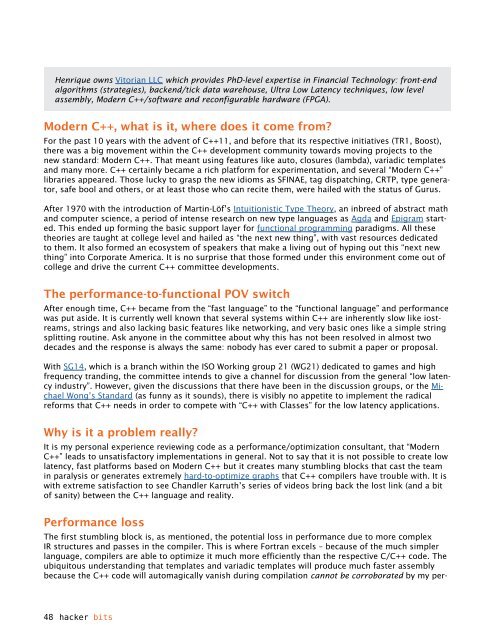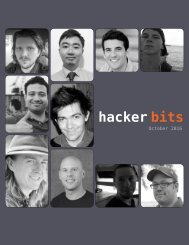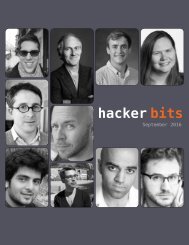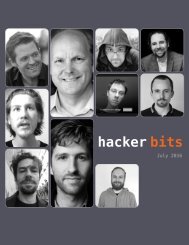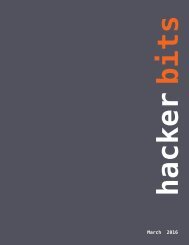Hacker Bits, Issue 11
HACKER BITS is the monthly magazine that gives you the hottest technology stories crowdsourced by the readers of Hacker News. We select from the top voted stories and publish them in an easy-to-read magazine format. Get HACKER BITS delivered to your inbox every month! For more, visit https://hackerbits.com/issue11.
HACKER BITS is the monthly magazine that gives you the hottest technology stories crowdsourced by the readers of Hacker News. We select from the top voted stories and publish them in an easy-to-read magazine format.
Get HACKER BITS delivered to your inbox every month! For more, visit https://hackerbits.com/issue11.
Create successful ePaper yourself
Turn your PDF publications into a flip-book with our unique Google optimized e-Paper software.
Henrique owns Vitorian LLC which provides PhD-level expertise in Financial Technology: front-end<br />
algorithms (strategies), backend/tick data warehouse, Ultra Low Latency techniques, low level<br />
assembly, Modern C++/software and reconfigurable hardware (FPGA).<br />
Modern C++, what is it, where does it come from?<br />
For the past 10 years with the advent of C++<strong>11</strong>, and before that its respective initiatives (TR1, Boost),<br />
there was a big movement within the C++ development community towards moving projects to the<br />
new standard: Modern C++. That meant using features like auto, closures (lambda), variadic templates<br />
and many more. C++ certainly became a rich platform for experimentation, and several “Modern C++”<br />
libraries appeared. Those lucky to grasp the new idioms as SFINAE, tag dispatching, CRTP, type generator,<br />
safe bool and others, or at least those who can recite them, were hailed with the status of Gurus.<br />
After 1970 with the introduction of Martin-Löf’s Intuitionistic Type Theory, an inbreed of abstract math<br />
and computer science, a period of intense research on new type languages as Agda and Epigram started.<br />
This ended up forming the basic support layer for functional programming paradigms. All these<br />
theories are taught at college level and hailed as “the next new thing”, with vast resources dedicated<br />
to them. It also formed an ecosystem of speakers that make a living out of hyping out this “next new<br />
thing” into Corporate America. It is no surprise that those formed under this environment come out of<br />
college and drive the current C++ committee developments.<br />
The performance-to-functional POV switch<br />
After enough time, C++ became from the “fast language” to the “functional language” and performance<br />
was put aside. It is currently well known that several systems within C++ are inherently slow like iostreams,<br />
strings and also lacking basic features like networking, and very basic ones like a simple string<br />
splitting routine. Ask anyone in the committee about why this has not been resolved in almost two<br />
decades and the response is always the same: nobody has ever cared to submit a paper or proposal.<br />
With SG14, which is a branch within the ISO Working group 21 (WG21) dedicated to games and high<br />
frequency tranding, the committee intends to give a channel for discussion from the general “low latency<br />
industry”. However, given the discussions that there have been in the discussion groups, or the Michael<br />
Wong’s Standard (as funny as it sounds), there is visibly no appetite to implement the radical<br />
reforms that C++ needs in order to compete with “C++ with Classes” for the low latency applications.<br />
Why is it a problem really?<br />
It is my personal experience reviewing code as a performance/optimization consultant, that “Modern<br />
C++” leads to unsatisfactory implementations in general. Not to say that it is not possible to create low<br />
latency, fast platforms based on Modern C++ but it creates many stumbling blocks that cast the team<br />
in paralysis or generates extremely hard-to-optimize graphs that C++ compilers have trouble with. It is<br />
with extreme satisfaction to see Chandler Karruth’s series of videos bring back the lost link (and a bit<br />
of sanity) between the C++ language and reality.<br />
Performance loss<br />
The first stumbling block is, as mentioned, the potential loss in performance due to more complex<br />
IR structures and passes in the compiler. This is where Fortran excels – because of the much simpler<br />
language, compilers are able to optimize it much more efficiently than the respective C/C++ code. The<br />
ubiquitous understanding that templates and variadic templates will produce much faster assembly<br />
because the C++ code will automagically vanish during compilation cannot be corroborated by my per-<br />
48 hacker bits


